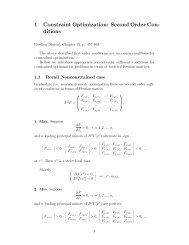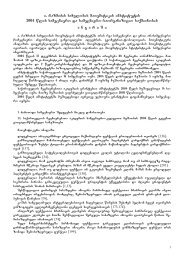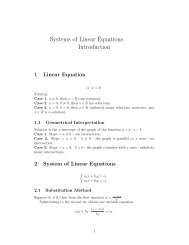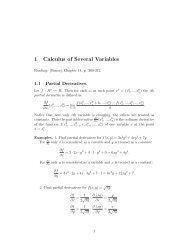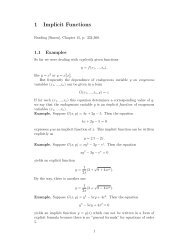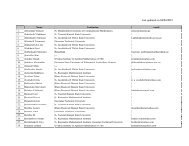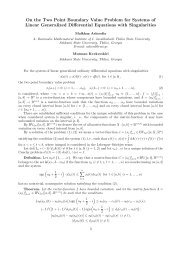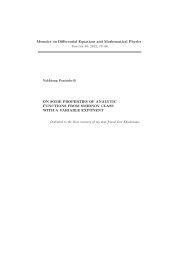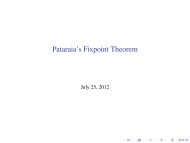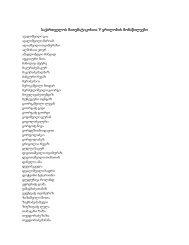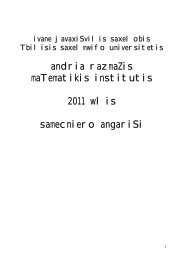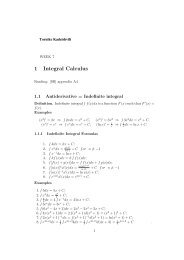FOR DIFFERENTIAL EQUATIONS OF FRACTIONAL ORDER
FOR DIFFERENTIAL EQUATIONS OF FRACTIONAL ORDER
FOR DIFFERENTIAL EQUATIONS OF FRACTIONAL ORDER
You also want an ePaper? Increase the reach of your titles
YUMPU automatically turns print PDFs into web optimized ePapers that Google loves.
Boundary Value Problems for Differential Equations of Fractional Order 59Since the solution (2.37) is an entire function of the parameter λ, we have∞∑u(x, λ) = S n (x)λ n . (2.38)Substituting (2.38) in (2.37) we have= x +∫ x0From (2.39) it followsn=0S 0 (x) + λS 1 (x) + λ 2 S 2 (x) + · · · =[(x − t) 1−α − λ(x − t) ][ S 0 (t) + · · · + λ n S n (t) + · · · ] dt. (2.39)S 0 (x) = x +S 1 (x) = −S 2 (x) =∫ x0∫ x0∫ x0(x − t) 1−α u(t) dt, (2.40)(x − t)S 0 (t) dt +∫ x(x − t) 1−α S 2 (x) dt +0∫ x(x − t) 1−α S 1 (x) dt, (2.41)0(x − t) 1−α S 1 (x) dt, (2.42). . . . . . . . . . . . . . . . . . . . . . . . . . . . . . . . . . . . . . . . . . . . . . . . . . .Solving the equation (2.40), we obtainS 0 (x) = xE ρ (x 1/ρ ; 2); S 0 (1) = 1.For solution of the equation (2.41) we will calculateThen∫ x0(x − t)S 0 (t) dt =a 0 (x)=x 3 E ρ (x 1/ρ ; 4)+∫ x0∫ x0tE ρ (t 1/ρ ; 2)(x − t) dt = x 3 E ρ (x 1/ρ ; 4).((x − t) 1/ρ−1 E ρ (x−t) 1/ρ ; 1 )t 3 E ρ (t 1/ρ ; 4) dt =ρ=−c 1(x 3 E ρ (x 1/ρ ; 4)+c 0 ρx 3+1/ρ[ E ρ(x 1/ρ ; 3+ 1 ρIt is likewise possible to show that(− 3+ 1 ( )E ρ x 1/ρ ; 4+ 1 ρρ)] ) .a 2 (x) = −cx 5 E ρ (x 1/ρ ; 6) + cρx 5+1/ρ E ρ(x 1/ρ ; 5 + 1 ρ)−(− cρ 5 + 1 ()x 5+1/ρ E ρ x 1/ρ ; 6 + 1 )−ρρ)−



